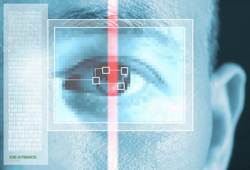Debating the ethics of security technologies
Biometrics is a rapidly developing field looking at how to identify people by their unique physical characteristics, such as fingerprints, the shape of their eyes or even by their behaviour, such as the way they walk. Many security applications are already using such technologies; for instance, in locks controlling entry into properties or the scanners at border control. However, innovations are greatly expanding the scope of biometrics further in areas such as surveillance, enabling governments and companies to collect huge amounts of information about people, like tracking their movements or identifying their habits. The ethics behind the use of such technology raises important questions: is it acceptable to infringe the privacy of individuals in the name of national security? At what point does surveillance turn into mass control of the population? Can such technologies be used to automatically enforce laws? And should data be shared between governments or with private sector organisations? In its bid to reform decision-making rules for security, the EU wants to consider in full the ethical issues surrounding the use of biometrics. The 'Rising pan-European and international awareness of biometrics and security ethics' (RISE) initiative started a global dialogue in this area, convening a number of meetings of top-level decision makers from Asia, Europe and the United States. The three-year project that was funded by the EU has raised awareness of the ethical and political implications of new security technologies amongst international authorities.



